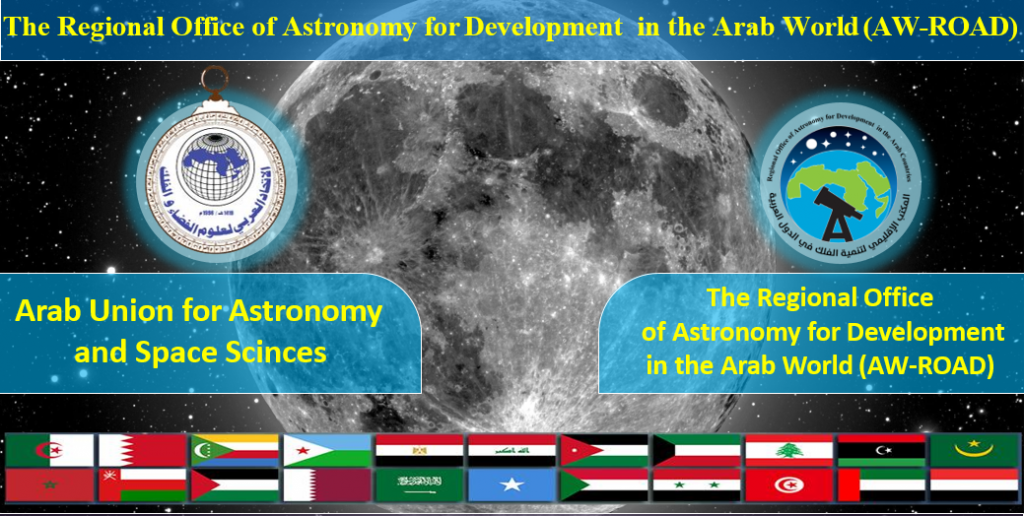
تأسس الاتحاد الفلكي الدولي (IAU) في 28 يوليو 1919. وهو اتحاد دولي لعلماء الفلك المحترفين ، على مستوى الدكتوراه وما بعده ، نشط في البحث المهني والتعليم في علم الفلك. تضم IAU ما مجموعه 12664 عضوًا فرديًا من علماء الفلك المحترفين من 96 دولة حول العالم (اعتبارًا من 1 فبراير 2017).
يلعب علم الفلك والفيزياء الفلكية وعلوم الفضاء (AASS) دورًا فعالاً في العلوم والتكنولوجيا وتنمية المجتمع. لسوء الحظ ، يتم استخدام نسبة صغيرة من هذه المعرفة بالفعل في التدريس في المدارس والجامعات والمؤسسات الأكاديمية الأخرى في البلدان العربية. يتمثل التحدي في توفير التطوير المهني الفعال لمعلمي وباحثي AASS على جميع المستويات ، من المدرسة الابتدائية إلى الجامعة. هناك حاجة ماسة لقنوات اتصال أفضل بين علماء الفلك وعلماء الفضاء العرب في الوقت الحاضر. في هذا الصدد ، فإن الخيار الأفضل هو التعرف على التراث الثقافي الواسع للحوض العربي ، ولا سيما في علم الفلك. يعد بناء مراصد حديثة وجيدة وقباب فلكية ومراكز أبحاث في المنطقة بالاشتراك مع علماء الفلك وعلماء الفضاء العرب أمرًا ضروريًا وسيكون خطوة ممتازة نحو تطوير AASS.
كان الاتحاد العربي لعلوم الفضاء والفلك (AUASS) نشطًا إلى حد ما في اقتراح مشاريع وتقديم مقترح لاستضافة مكتب إقليمي في العالم العربي. وجدت IAU أن اقتراح AUASS قوي ومبرر إلى حد ما لأنه يمثل جميع الدول العربية. خلال المؤتمر العربي الحادي عشر لعلم الفلك وعلوم الفضاء ، الذي عقد في الشارقة (الإمارات العربية المتحدة) في الفترة ما بين 5 و 8 ديسمبر 2014 تحت رعاية الشيخ سلطان بن محمد القاسمي ، حاكم الشارقة ، ناقشت AUASS هذه القضية مع السيد كيفن جوفندر (من OAD) بحضور أعضاء المجلس الأعلى لـ AUASS. أخيرًا ، اتخذوا قرارًا باختيار المملكة الأردنية الهاشمية لاستضافة مكتب IAU لعلم الفلك من أجل التنمية في المنطقة العربية. تم توقيع اتفاقية في هذا الصدد في الجمعية العامة للاتحاد الفلكي الدولي في هونولولو في أغسطس 2015.
The International Astronomical Union (IAU) was founded on the 28th of July 1919. It is an international association of professional astronomers, at the PhD level and beyond, active in professional research and education in astronomy.The IAU includes a total of 12,664 individual members who are professional astronomers from 96 countries worldwide (as of 1 February 2017).
Astronomy, Astrophysics and Space Sciences (AASS) play an effective role in Sciences, Technology and Community Development. Unfortunately, a small percentage of this knowledge is actually used in teaching at schools, universities and other academic institutions in Arab countries. The challenge is to provide effective professional development for AASS educators and researchers at all levels, from elementary school to university. There is an urgent need for a better communication channels among Arab astronomers and space scientists nowadays. In this respect, the best choice is to identify in the vast cultural heritage of the Arab basin, particularly in astronomy. Building modern and good observatories, planetariums and research centers in the region jointly by Arab astronomers and space scientists is essential and will be an excellent step towards developing AASS.
The Arab Union of Astronomy and Space Science (AUASS) has been rather active in proposing projects and submitting a proposal to host a regional office in Arab World. IAU found the AUASS proposal rather strong and justified since it represents all of Arab countries. During the 11th Arab Conference on Astronomy and Space Science, which was held in Sharjah (United Arab Emirates) between the 5th and 8th of December 2014 under the patronage of Sheikh Sultan Bin Mohammed Al-Qasemi, the ruler Of Sharjah, the AUASS had discussed this issue with Mr. Kevin Govender (from the OAD) with the presence of the high council members of AUASS. Finally, they took a resolution of selecting the Hashemite Kingdom of Jordan to Host the IAU Office of Astronomy for Development in the Arab region. An agreement was signed in this regard at the IAU’s General Assembly in Honolulu in August2015.